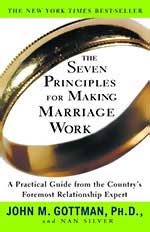
It’s no surprise that the words “marriage” and “work” are so often uttered in the same breath. After all, once the vows are said and the last crumbs of the wedding cake gobbled up, the real work begins. And while couples dive headlong into the rites of married life, such as buying a home and having kids, they often forget the day-to-day maintenance (translation: work) needed to keep their relationship happy and strong.
John M. Gottman, PhD, is the author of The Seven Principles for Making Marriage Work, first published in 1999. The book’s advice is precious for any couple, no matter how long or how happily married they are. The book, which Gottman co-authored with Nan Silver, is the result of his landmark study of how married couples interact on a daily basis. Couples were filmed in a Love Lab, a home-like setting where they were asked to carry on their normal, daily interactions, but with video cameras present. Sort of like reality T.V.without the audience watching at home. Gottman and his team studied couples in the Love Lab for 16 years, to the point, he claims, that he could predict with 91 percent accuracy, which couples would divorce.
So what are some of Gottman’s secrets to a happy, lasting marriage? You might be surprised. It turns out those romantic dinners and getaways, special little gifts and heart-to-heart talks don’t lead to a golden wedding anniversary. Instead, couples need to really know and respect each other, take an interest in each other’s lives, and turn to each other in tough times.
 KNOW THY OTHER HALF
KNOW THY OTHER HALF
The Seven Principles includes several lists of questions and quizzes for couples to take to gauge how well they know and appreciate each other. Questions ask couples to identify key moments of happiness and sadness or stress in their partner’s life, including before they met. Can a husband name his wife’s co-workers, including which ones she likes the most and the least? Can a wife say what is causing her husband the most stress and name his three closest friends? His least favorite relative? Can each discuss the other’s hopes, dreams, goals and life philosophies? Can each easily make a list of the things they admire most in their spouse?
Some of these are tough questions, and they really test a couple’s intimate knowledge of each other.
But even when a couple doesn’t have the knowledge, trust, respect and friendship so crucial to marital longevity, these traits can still be nurtured and developed over time, so long as both are willing to—you guessed it—work on them.
Read Related: New Choices: First Comes Marriage, Then Comes Baby…Maybe
GO AHEAD, FIGHT IT OUT, BUT PLAY FAIR
Guess what? Happy couples fight. But how they fight, according to Gottman, is a key predictor to whether or not they will stay married. He warns of what he terms “The Four Horsemen of the Apocalypse”—the negative markers that so often spell doom for a marriage. These are CRITICISM, CONTEMPT, DEFENSIVENESS and STONEWALLING. If couples can argue, but still avoid pulling out one or more of these negative behaviors, they can avoid the long term, simmering discontent that eventually leads either to divorce, or to having separate lives under the same roof. Gottman distinguishes positive methods for arguing from “The Four Horsemen” as follows:
Unlike CRITICISM, complaints cite a specific problem—not a character flaw. Criticism just picks and insults.
A complaining wife: I’m really ticked off that you didn’t empty the dishwasher like I asked.
A critical wife: Why do you always have to be so lazy?!
CONTEMPT rears its ugly head when one or both partners mocks and belittles the other, rather than looking to diffuse an argument.
Wife: I’m sorry honey. I’ll try to be keep better track of household expenses.
Her husband has a chance to be conciliatory, or he can choose contempt.
Conciliatory husband: Okay; it’s something you really need to work on, but I’ll help you.
Contemptuous husband: Oh really? Like all the times you tried before? We know how well those went.
DEFENSIVENESS is the third dance partner to criticism and contempt. As one partner escalates his or her attack, the other becomes increasingly defensive.
Wife: Why do you keep ignoring the kids and me by working late every night?
Husband: You have no idea how hard I work for this family! Would you rather we all just starve?
The Fourth Horsemen, STONEWALLING, occurs when one spouse is either so unengaged in the marriage or so beaten down by the other’s criticism and contempt, that he or she simply stops responding. Maybe it’s the “silent treatment” or maybe it’s responding in one word answers, “uh-huh, no,” etc., but this lack of engagement can eventually turn into a permanent way of communicating—or not communicating—between a married couple. And it’s the death knell of many marriages.
CIRCLE THE WAGONS, AND PUT YOUR MARRIAGE FIRST
When times are tough, do you look to your spouse for love and support (and offer it to him, as well), or retreat into your own private misery?
According to Gottman, a key aspect of really knowing and liking your other half is to defend him or her in times of adversity. This is when a couple needs to circle the wagons and be strong for each other. That means, even if you see that your husband has been a little distracted at work, you stick by him after he gets a bad review from the boss. When your wife argues with her best friend, Kathy, you don’t tell her she’s being unreasonable, you take her side and tell her that Kathy will come around eventually.
This turning “towards each other,” as Gottman terms it, reassures each spouse that the marriage is a source of strength and support, his or her “go-to” spot in difficult times (and good times, too, of course).
By making each other a priority, couples put their marriage first. And these are the marriages most likely to survive and thrive. And maybe, just maybe, after a while, all that work starts to feel like second nature, and a little bit less like work.












